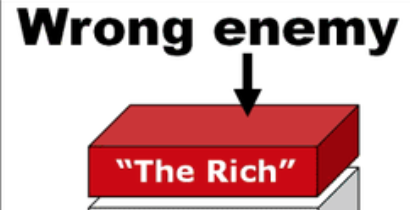It’s not often that I peruse political sites. Since I’ve heard most of them before, the arguments they make are almost entirely predictable.
But sometimes one stumbles onto a gem by accident. Thanks to a Facebook meme—whose proximate source is the blog International Liberty, and whose ultimate source is a book cited at that site—I’ve stumbled onto the one depicted below:

Class warfare has been a recurring staple of politics at least since the time of Spartacus, leader of a pre-imperial Roman slave rebellion. It remains a central tenet of Marxism—an ideology which, despite the disintegration of the Soviet bloc 25 years ago, is by no means dead. To be sure, we haven’t seen much of it in America: the closest we came to outright class warfare was during the Great Depression, when socialism and even communism had considerable influence on American politics.
But lately it’s been making something of a comeback in America.
Income inequality has reached heights unseen since the 1920s. Much of the support for Donald Trump in this Republican presidential-primary season cycle comes from the disillusioned working and lower-middle classes, whose economic position has gradually eroded since the 1970s and 80s. For similar reasons, a significant minority of Democrats who aren’t college students support Bernie Sanders over Hillary Clinton; they see the latter as being in bed with Wall Street, which many Americans blame, rightly or wrongly, for the severe recession of 2008-9. Accordingly, Democratic calls for higher taxes on “the rich” are popular, while Republicans gain donors by opposing such calls.
Such trends, however, are unlikely to be productive. For there’s no agreement among economists that significantly higher taxes on, say, “the one percent” would do more good than harm or more harm than good, either to government coffers or to the prospects of ordinary Americans. And there’s certainly no taste in the U.S. for full-on socialism, which entails state ownership of the most important means of production.
But regarding class warfare, there is one important thing most Americans can agree on.
Among both “the rich,” defined as the top ten percent in terms of income, and among the bottom 90%, there are “earners, entrepreneurs, and protectors” who are net “givers”—i.e. net producers of collective wealth—and “predators, cronies, and rent-seekers” who are net “takers”—i.e. net drains on collective wealth. It is relatively uncontroversial that the former should be encouraged and the latter discouraged, the former always rewarded and the latter sometimes punished. So if politicians want to tap into the discontent of those being left behind through no fault of their own, why not make that their theme?
The political obstacles to doing that are easy to locate. Democrats can’t afford to alienate people, such as some government workers, unions, and welfare recipients, who are objectively net drains on our collective wealth. Neither party wants to alienate people who fatten on “corporate welfare” such as entrenched public subsidies and no-bid contracts. And Republicans certainly don’t want to alienate people who get rich on speculative financial transactions that don’t create real wealth. But I suspect that a national politician who adopted the “right-enemy, wrong-enemy” theme would be very popular indeed.
The rationality of the theme surely makes it worth a try. Perhaps if enough people thought and spoke in such terms, our politics could be changed for the better.
















1 Comment
Tom
October 26, 2022, 3:51 amThe meme has vanished!
REPLY